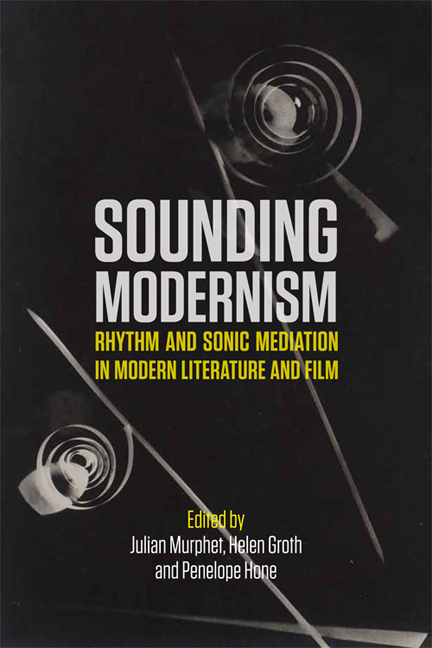Book contents
- Frontmatter
- Contents
- Acknowledgements
- 1 Introduction: Sounding Modernism 1890–1950
- Part One Writing Modern Sound
- Part Two Mediated Voices
- 4 Bottled Bands: Automatic Music and American Media Publics
- 5 How to Listen to Joyce: Gramophones, Voice and the Limits of Mediation
- 6 Sounding Region, Writing Accent: A. G. Street and the BBC
- 7 Partial to Opera: Sounding Willa Cather's Empty Rooms
- 8 Elliptical Sound: Audibility and the Space of Reading
- Part Three Difficult Voices
- Part Four Modern Rhythm: Writing, Sound, Cinema
- Notes on Contributors
- Bibliography
- Index
6 - Sounding Region, Writing Accent: A. G. Street and the BBC
from Part Two - Mediated Voices
Published online by Cambridge University Press: 22 December 2017
- Frontmatter
- Contents
- Acknowledgements
- 1 Introduction: Sounding Modernism 1890–1950
- Part One Writing Modern Sound
- Part Two Mediated Voices
- 4 Bottled Bands: Automatic Music and American Media Publics
- 5 How to Listen to Joyce: Gramophones, Voice and the Limits of Mediation
- 6 Sounding Region, Writing Accent: A. G. Street and the BBC
- 7 Partial to Opera: Sounding Willa Cather's Empty Rooms
- 8 Elliptical Sound: Audibility and the Space of Reading
- Part Three Difficult Voices
- Part Four Modern Rhythm: Writing, Sound, Cinema
- Notes on Contributors
- Bibliography
- Index
Summary
Midway through his brilliant cultural history of ventriloquism, Steven Connor quotes part of a poem by Thomas Hood, about the ‘polyphonist’ Mr Love, who, reputedly, could move like lightning between ‘the voices of persons of all ages, grades and professions’ while deriving his power and value (his cultural capital) from the ‘very invisibility of the objects, entities, and actions’ he invoked:
His Landlord of the Nag's Head is
By scores admired most
Indeed, in this he couldn't fail
Who's in himself a HOST.
Nine perfect voices he commands,
And quickly changes each:
He's quite a walking grammar –
For he boasts nine parts of speech! (312)
Later, in the interwar period, that hyperbolically delineated role was occupied by the BBC, which equally drew on its ability to remake space with invisible vocalities, which equally controlled the power to voice all shades, ranges and regions – and yet, so often failed in a sense to be, like Mr Love, a good ‘host’. Indeed, in its inclusion of regional and working-class accent (or even that of the landlord of the Nag's Head), whether ghettoised into variety performance, framed and offset by the ‘official’ BBC vocality of received pronunciation, or quite literally ventriloquised, performed by actors, the Corporation generally reproduced what Connor refers to as the ‘ludicrousness of ventriloquism as spectacle’ (313) – here, the spectacle of difference.
The positioning of regional broadcasting under the BBC Regional Scheme put into place beginning in 1929 was in this respect doubly vexed. Although the seven administrative regions were able to feature on their own regional wavelengths, and often across the regional network, local speakers, dialects and productions – serving as both alternative and corrective to the BBC monoculture – they were expected to contribute only twenty or so original hours a week, and to draw extensively on ‘diagonalised’ programming from the national service. Their budgets were allocated and programme planning overseen by London, which operated on the principle that ‘no Region should embark on an activity which could be better done elsewhere’ – especially in London.
- Type
- Chapter
- Information
- Sounding ModernismRhythm and Sonic Mediation in Modern Literature and Film, pp. 77 - 93Publisher: Edinburgh University PressPrint publication year: 2017



